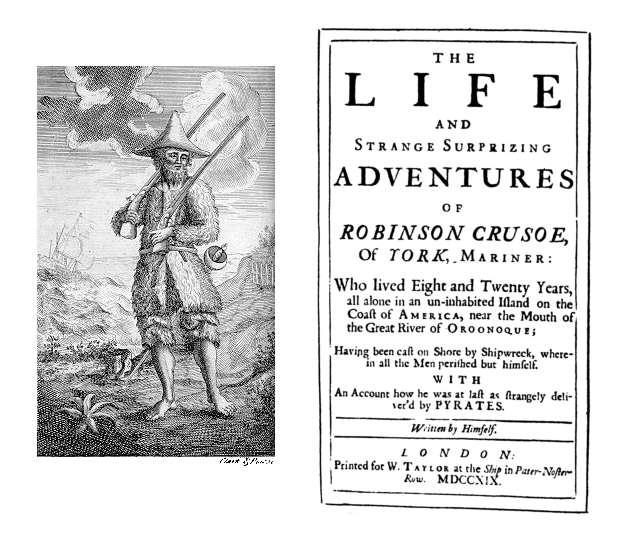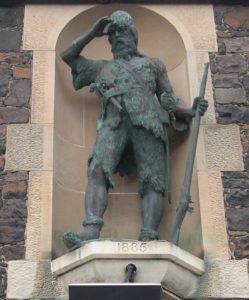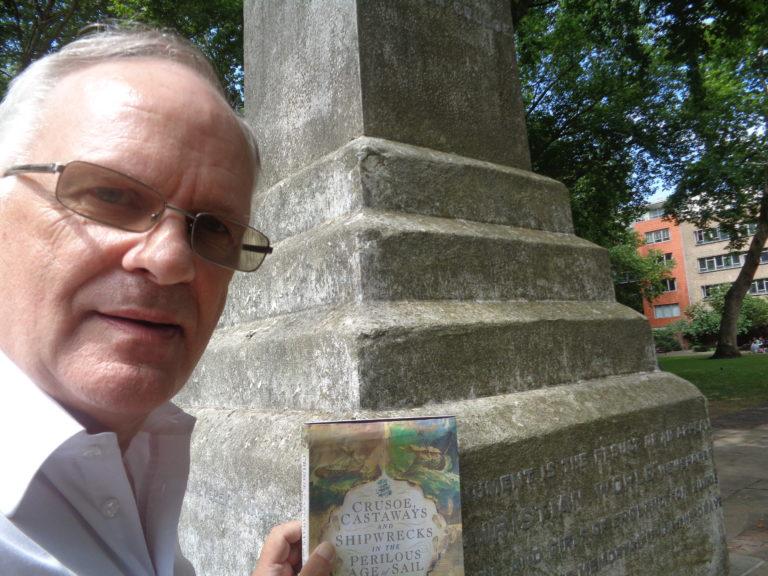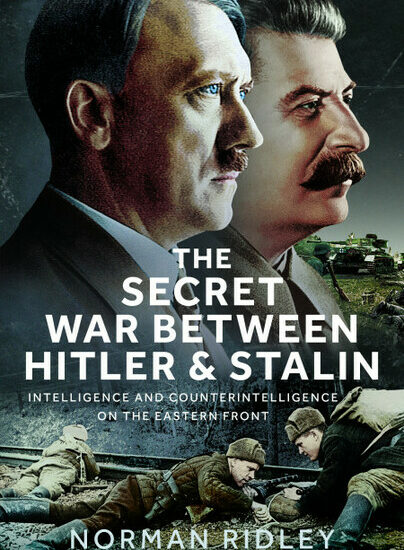Happy Birthday ‘Robinson Crusoe’ – 300 years old, and still going strong!
The 25th April 2019 marks the 300th anniversary of the publication of Robinson Crusoe. Our new release by Mike Rendell looks at some of the stories which inspired Daniel Defoe – stories of bravery, courage, determination and good fortune. In this guest post, Mike explores the ongoing effect of this unique book. Enjoy!
There
are not many books which celebrate a tercentenary – and are still
in print. Even fewer can claim to have been translated into every
single major world language – and spawned variations in opera, in
films, on television and on radio, in cartoon strips and in computer
games. The book is, of course, “Robinson Crusoe”, published on 25
April 1716 and in the intervening centuries more than 700 different
editions have appeared.

The
book didn’t hang around on the bookshelves for long – the public
were entranced by the story of a castaway’s struggle for survival,
and four editions appeared in its first year alone. Pirated versions
flooded the market. The author, Daniel Defoe, wrote a follow-up
entitled “Farther Adventures of Robinson Crusoe”, which came out
in late 1719. For the better part of a century it was customary for
the two stories to be sold as a two-volume set, although nowadays the
“Farther Adventures” have dropped off the graph. For anyone
interested, the “Farther Adventures” see Crusoe return to his
island, before heading for Brazil, across to the tip of South Africa,
and round to Madagascar where he is marooned for several years.
Incredibly, his round-the-world peripatetic existence sees him walk
across China, into Russia, through Siberia and over to Archangel
before catching a lift back to London on a passing ship.
Personally,
I think Defoe should have left his hero at the end of the original
book and not bothered with Part Two. Undeterred, Defoe even wrote a
third book in the series – but this time as a non-fiction work
looking at the underlying themes such as Sin, Redemption and so on.
This third part bombed totally and, thankfully, disappeared without
trace.

But
Robinson Crusoe deserves to be celebrated – even if nowadays it is
often reduced to a children’s adventure story. It struck a chord
with 18th century audiences, and it still strikes a chord today.
Think of the Tom Hanks film “Cast Away”, in which he plays the
part of a FedEx employee stuck on a Pacific Island after a plane
crash. The story was so realistic that people assume that it was
based upon a real-life incident – it wasn’t. Or think of “The
Martian” with Matt Damon – it explores exactly the same themes
covered in Defoe’s novel and poses the same question: how would we
manage if we were stripped of all the trappings of modern
civilization?
It’s
a theme which is reflected in the radio programme “Desert Island
Discs” (now running for over 75 years) and in Reality TV programmes
such as “I’m a Celebrity – Get me out of here”. And it has
spawned any number of television programmes where a celeb is stranded
‘alone’ and expected to cope. Off hand, I recall the model
Julie Ege using it as an excuse for a bikini-modelling shoot, and
Joanna Lumley being cast adrift on an island off Madagascar – and
making a pair of cave shoes out of her bra. More recently, the actor
Robson Greene had himself cast adrift on a remote Indonesian island.
From memory he lasted all of three hours before being whisked away
suffering from stomach problems, which rather suggests that he wasn’t
quite as ‘alone’ as the programme would have us believe.

Defoe’s
“Robinson Crusoe “was based upon a number of real-life incidents.
Usually Alexander Selkirk is trailed as being the main source –
but I rather think that Defoe, a journalist, was happy to meld a
number of different escapades. For my money, these definitely include
the experiences of William Dampier. Not only did he circumnavigate
the world three times – and write a travelog which was hugely
popular – but he was stranded on the then uninhabited island of
Ascension in the middle of the Atlantic Ocean. He also returned to
Britain with a ‘Man Friday’ in tow – a native from the
Philippines named Prince Geolo (otherwise Jeoly) and who was
exhibited as a sort of travelling freak show so that visitors could
gawp at his tattoos. Sadly, the Painted Prince (as he was referred
to) caught smallpox and died in Oxford shortly after he
reached these sickly climes, but his story would have been well-known
to Defoe.
Another
likely inspiration for Defoe’s ultimate castaway hero was Henry
Pitman, an English-born supporter of the Duke of Monmouth who was
sent to Barbados as an indentured servant but who escaped and lived
for some time on an island near Aruba in the Caribbean, encountering
cannibals and pirates along the way. Another contributor may have
been Robert Knox, abandoned on the island of Ceylon for over twenty
years, and who wrote a lengthy journal describing his battle for
survival, his mental trials and tribulations, and his ultimate
escape. It even comes complete with a description of the power of an
unexpected footprint in the sand….
To
mark this auspicious day, I have brought out my latest book,
published by Pen
& Sword,
called “Crusoe, Castaways and Shipwrecks in the Perilous Age of
Sail”. It looks at the phenomenal success of what has been
described as the first English novel, considers the various real-life
incidents which may have influenced Defoe, and puts the book in
context of the many maritime disasters which befell sailors on the
eighteenth century. Horrific storms, mutiny, faulty navigation
leading to shipwrecks, piracy, broken compasses – all could result
in loss of life, but also in remarkable tales of survival. No-one
would think that being stranded was a bowl of cherries – but Defoe
showed that it could fire the public interest.


Crusoe, Castaways and Shipwrecks in the Perilous Age of Sail is available to order now from Pen and Sword Books.

